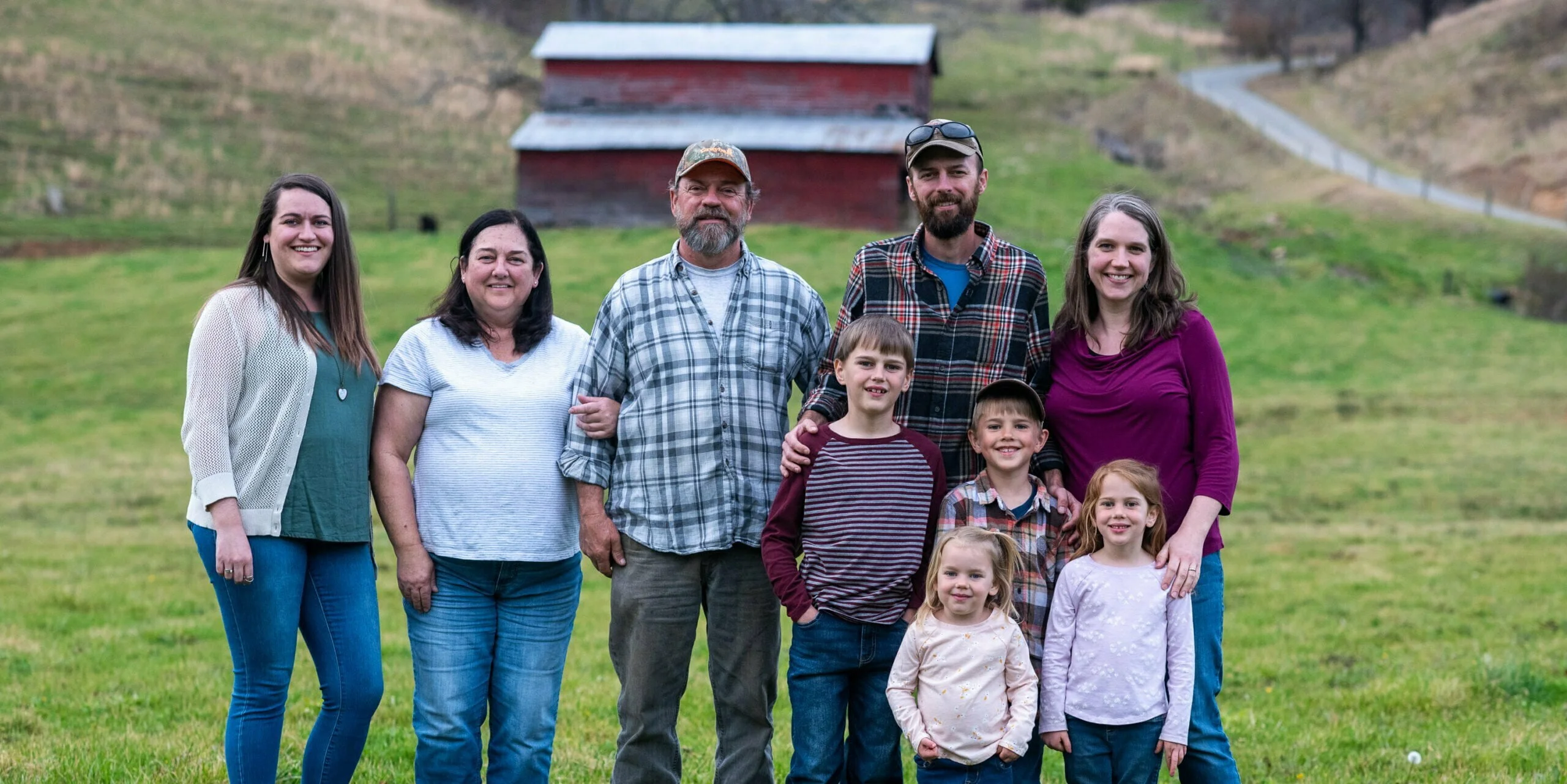“What’s happening now with Dillingham Family Farm is what I hoped would happen—that our children would become more involved,” says Brenda Dillingham. “I can transition out of things and know that the farm will continue on and that the grandchildren will be a part of that one day. That’s really important to me.”
The Dillingham family’s history in the region dates back to the late 1700s. Dillingham Family Farms, in Barnardsville, NC, was historically a tobacco farm, which also produced some beef cattle and hay. These days, the land is stewarded by the eighth generation of farmers who bring with them new energy and ideas. That includes Brenda’s children, Justin and Jenna, along with Justin’s wife, Emily. They are carrying on the family tradition, but also diversifying their products, rebuilding the soil health, and continuing to serve their community, neighbors, and family.
“In our area, a lot of people were in beef cattle,” says Justin. “They sold them into the commodity system and then went to the grocery store and bought beef, which is kind of crazy. But that’s what happened all over the country. We’re still in the process, but we’d love to produce almost everything that we consume, as well as produce a whole range of products and sell it directly to customers, because the commodity system is so volatile.”
Twenty years ago, Dillingham Family Farms was still growing some tobacco, but was starting to sell grassfed beef and lamb, pork, chicken, and eggs, directly to their community. While that shift was related to the tobacco buyout in 2004, it was also driven by a desire to improve the health of their land.
“We were learning more, and saw more profit potential from other ventures, as well as the potential to improve our land, which has become more of a focus,” says Justin. “Tillage and especially tobacco cropping was something that had the potential to be very detrimental. But even at its best, it was not building the soil. We’re happy to be doing other things.”
Justin always knew he wanted to farm. He says, “I’m the oldest of my family, and so I was always helping my grandfather and father around the farm. I’ve always loved to work outside and work with animals as well as just be on the land. I’ve been fortunate enough to have a family situation where it was more feasible for me than perhaps others to farm.”
Jenna says it took her a bit longer to appreciate what the family shared on the farm. “I had more reluctance to go out and to help with the farm, but the older that I got, the more I understood about what the farm entailed and what it meant for our family. I’ve always had that draw to come back to the farm, and after two corporate jobs and other ventures, it’s become a reality.”
Emily, who manages the website and online store, first met Brenda at the Mars Hill Farmers & Artisans Market, where Emily sold baked goods. Eventually she met Justin as well, and they found they shared a common dream of farming, family, and growing healthy food. They now have four children, who also participate on the farm (the ninth generation).
“My grandpa always had beef cattle, so I was familiar with the idea of it,” Emily says. “I love the way people find farming and each other in the world.”
Emily was instrumental in launching the farm’s website in 2018. At first it mainly allowed a small number of customers to preorder and select a pickup location. But in 2020, in the early days of the COVID-19 pandemic, it became a lifeline.
“None of us knew what was going to happen in 2020 and ’21, but that ended up being a really good thing,” Emily says. “We were already set up to do online sales. We were really glad to be able to offer no contact delivery for our neighbors when they didn’t want to or couldn’t get out to the store or market.”
In addition to grassfed beef, pastured pork, free-range chickens, and laying hens, Jenna has planted a berry patch on the farm with strawberries, blueberries, and blackberries. The family is also selling value added goods like elderberry syrup and homemade jam.
Justin says that they have had success as a family farm because they sell directly to consumers. Not only is this better for the farmer, but he says it’s better for the consumer, too.
“Most of our customers are people who are interested in local food that they can trust, animals that are playing, that are healthy, that they can actually go and look at the field where the cow came from and see that it truly is living on grass, outdoors in a pasture.”

